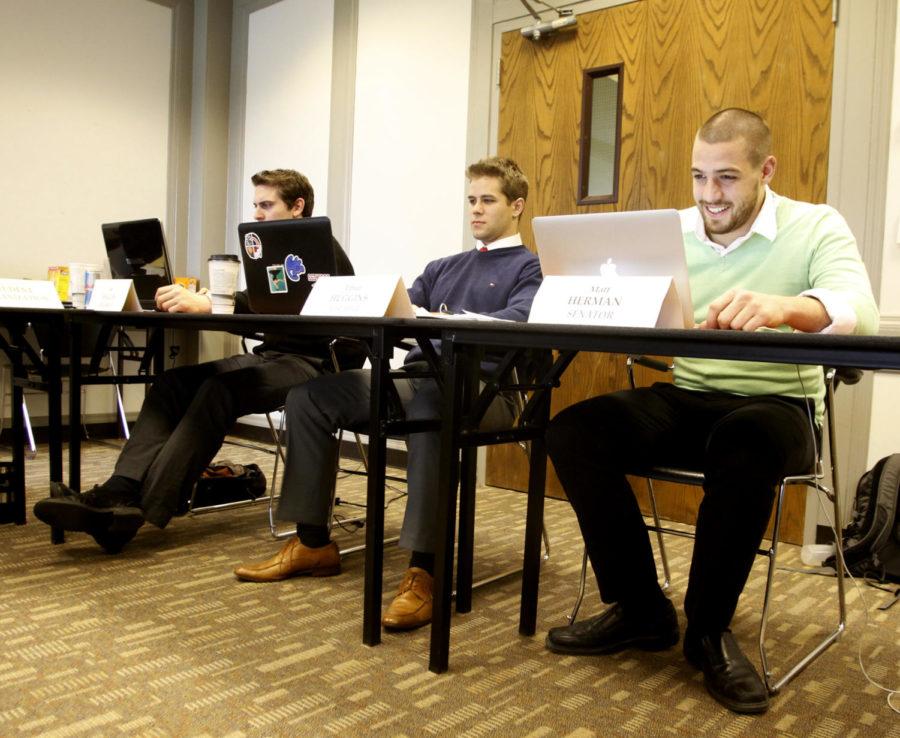Regular Allocations nearing the end
Photo: Suhaib Tawil/Iowa State Daily
The Government of Student Body staff meeting met with club members to discuss funding options on Saturday, March 9, 2013, at the Memorial Union.
March 28, 2013
Nearly 70 hours later, the Government of the Student Body (GSB) is one step closer to being done with Regular Allocations.
Regular allocations are time when the GSB Finance Committee disperses the nearly $2 million in student fee money to different student clubs and organizations.
The Finance Committee began meeting with groups in February. After a group would attend a mandatory informational session, they were scheduled a hearing time to review their budget with the Finance Committee.
The Finance Committee spent nearly 70 hours in these hearings and in various budget-balancing sessions.
The funds that Finance Committee allocated, and to where, were presented in a bill at the GSB Senate meeting March 27, 2013. The bill is voted on as a whole, but senators are allowed to pull an individual group’s budget if they feel they are getting too much or too little funds. A group can also ask a senator to do this on their behalf.
Only nine budgets were pulled at the March 27 meeting, and all of them were voted on, except a change to the KURE 88.5 budget, which will be voted on April 3.
Among the other eight budgets pulled were the Russian Student Speaking Association, ISU Film Producers Club, GSB, ISU Democrats, Team PrISUm, Student Alumni Leadership Council (SALC), Asian Pacific American Awareness Coalition and the Gamma Rho Lambda Colony.
Some groups’ budget request changes were simple, while others were not. The two that took up the most discussion time were changes to the GSB and the SALC budgets.
The GSB budget was the longest-debated budget. Many senators wanted to have more printing money and more money to send out mass emails to the student population.
There was also an urge to fund parking passes for the GSB speaker of the senate and vice speaker of the senate, as they are the only officers of the senate who do not receive anything.
One of the more controversial requests was from president-elect Spencer Hughes. The Hughes-Kletscher campaign focused on changes to the Executive Scholarship Program. Currently, the president, vice president and finance director receive a scholarship to fulfill their duties in GSB.
Hughes and vice president-elect Hillary Kletscher said they would not accept the funds. Anticipating this, GSB Finance Committee voted to allocate those funds into giving more funds to student groups.
At the March 27 meeting, Hughes explained that he only meant to eliminate executive scholarships in the fall and spring, but in the summer these funds would be necessary for those receiving executive scholarships to operate.
There was an argument over what the difference was between receiving funding in the summer and during the fall and spring.
Finance Committee member Khayree Fitten said it was “disingenuous” to ask for summer funding.
“All along the idea was to cut [executive scholarships] down in the fall and spring,” Hughes said. “The summer funding is not something I ever anticipated cutting.”
Kletscher said she still did not need the funds. Hughes was granted $3,540.90 for summer tuition, room and board.
The Finance Committee also gave GSB an addition $100 for mass emails, $54 for printing, and the two parking passes. The senate voted and passed these changes.
The SALC was not given funding for a stage used for the Homecoming pep rally. A group representative reminded the GSB senate that this was an event that has been going on for 101 years and roughly 5,000 students attend the event.
The stage that SALC was requesting funds for is the same stage they used for the pep rally last year. However, funding came from other sources than GSB.
“It will be possible for you guys to fund it yourselves,” said Finance Committee member Ian Wallis. “Its not necessary for it to come from us.”
Senator and Finance Committee member Daniel Rediske had a different view.
“Due to the fact this isn’t for-profit and this is for the benefit of students and the community, I urge for further discussion,” Rediske said as discussion was slowing down. “Don’t look at it as ‘Well, it’s going to happen either way,’ put student fee money toward it if you think it benefits students. It shouldn’t matter if it’ll happen whether or not without GSB funding.”
The SALC was requesting $8,000 to fund this stage. The senate did vote for Finance Committee to review this budget three times. After almost an hour of debate and discussion, and motions to fund for less than the $8,000, no money was granted to SALC for the stage.
Next week, the GSB senate will vote on the changes to the KURE 88.5 budget to conclude Regular Allocations for the upcoming fiscal year.










